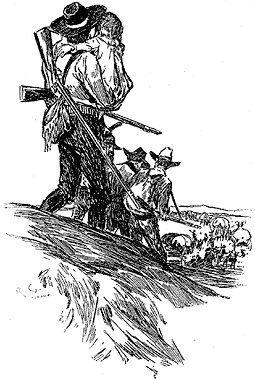| On the Great Alkali Plain 4 | The Flower of Utah 1 |
The cries of the foul birds awoke the two sleepers, who stared about them in bewilderment. The man staggered to his feet and looked down upon the plain which had been so desolate when sleep had overtaken him, and which was now traversed by this enormous body of men and of beasts. His face assumed an expression of incredulity as he gazed, and he passed his bony hand over his eyes. “This is what they call delirium, I guess,” he muttered. The child stood beside him, holding on to the skirt of his coat, and said nothing, but looked all round her with the wondering, questioning gaze of childhood.
The rescuing party were speedily able to convince the two castaways that their appearance was no delusion. One of them seized the little girl and hoisted her upon his shoulder, while two others supported her gaunt companion, and assisted him towards the wagons.

“My name is John Ferrier,” the wanderer explained; “me and that little un are all that’s left o’ twenty-one people. The rest is all dead o’ thirst and hunger away down in the south.”
“Is she your child?” asked someone.
“I guess she is now,” the other cried, defiantly; “she’s mine ’cause I saved her. No man will take her from me. She’s Lucy Ferrier from this day on. Who are you, though?” he continued, glancing with curiosity at his stalwart, sunburned rescuers; “there seems to be a powerful lot of ye.”
“Nigh unto ten thousand,” said one of the young men; “we are the persecuted children of God – the chosen of the Angel Moroni.”
“I never heard tell on him,” said the wanderer. “He appears to have chosen a fair crowd of ye.”
“Do not jest at that which is sacred,” said the other, sternly. “We are of those who believe in those sacred writings, drawn in Egyptian letters on plates of beaten gold, which were handed unto the holy Joseph Smith at Palmyra. We have come from Nauvoo, in the state of Illinois, where we had founded our temple. We have come to seek a refuge from the violent man and from the godless, even though it be the heart of the desert.”
The name of Nauvoo evidently recalled recollections to John Ferrier. “I see,” he said; “you are the Mormons.”
“We are the Mormons,” answered his companions with one voice.
“And where are you going?”
“We do not know. The hand of God is leading us under the person of our Prophet. You must come before him. He shall say what is to be done with you.”
They had reached the base of the hill by this time, and were surrounded by crowds of the pilgrims – pale-faced, meek-looking women; strong, laughing children; and anxious, earnest-eyed men. Many were the cries of astonishment and of commiseration which arose from them when they perceived the youth of one of the strangers and the destitution of the other. Their escort did not halt, however, but pushed on, followed by a great crowd of Mormons, until they reached a wagon, which was conspicuous for its great size and for the gaudiness and smartness of its appearance. Six horses were yoked to it, whereas the others were furnished with two, or, at most, four apiece. Beside the driver there sat a man who could not have been more than thirty years of age, but whose massive head and resolute expression marked him as a leader. He was reading a brown-backed volume, but as the crowd approached he laid it aside, and listened attentively to an account of the episode. Then he turned to the two castaways.
“If we take you with us,” he said, in solemn words, “it can only be as believers in our own creed. We shall have no wolves in our fold. Better far that your bones should bleach in this wilderness than that you should prove to be that little speck of decay which in time corrupts the whole fruit. Will you come with us on these terms?”
“Guess I’ll come with you on any terms,” said Ferrier, with such emphasis that the grave Elders could not restrain a smile. The leader alone retained his stern, impressive expression.
“Take him, Brother Stangerson,” he said, “give him food and drink, and the child likewise. Let it be your task also to teach him our holy creed. We have delayed long enough. Forward! On, on to Zion!”
“On, on to Zion!” cried the crowd of Mormons, and the words rippled down the long caravan, passing from mouth to mouth until they died away in a dull murmur in the far distance. With a cracking of whips and a creaking of wheels the great wagons got into motion, and soon the whole caravan was winding along once more. The Elder to whose care the two waifs had been committed led them to his wagon, where a meal was already awaiting them.
“You shall remain here,” he said. “In a few days you will have recovered from your fatigues. In the meantime, remember that now and forever you are of our religion. Brigham Young has said it, and he has spoken with the voice of Joseph Smith, which is the voice of God.”
| On the Great Alkali Plain 4 | The Flower of Utah 1 |